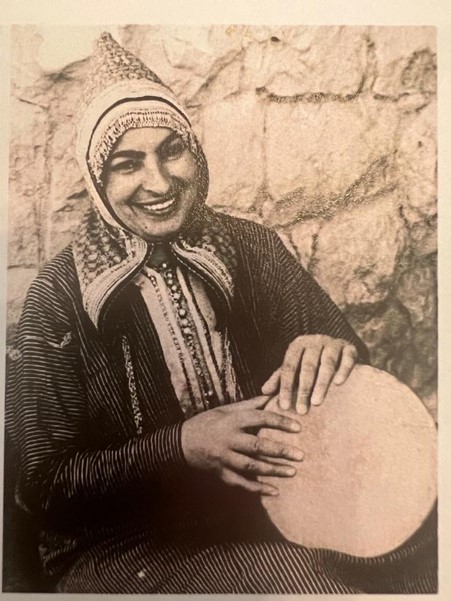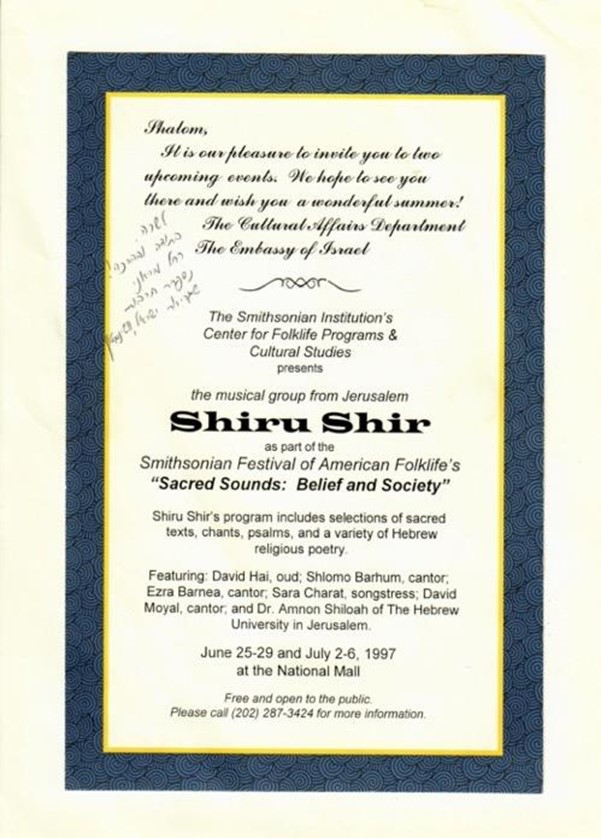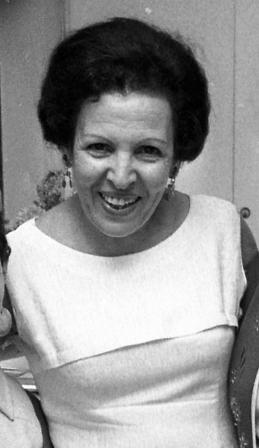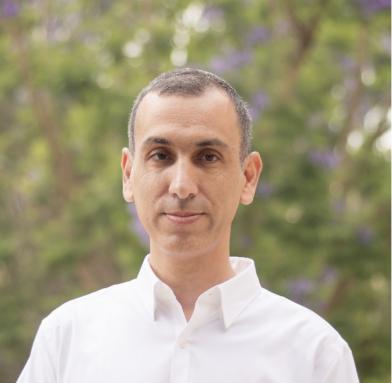Sarah Harat was born in Sana'a in 1922 to Abraham Khobara and Yonah (Khamama) from the Beit Halevi family. In 1930, when she was eight years old, her family moved to British Mandate Palestine, settling in Sha’arei Pinah, an area adjacent to the Nahalat Zvi neighborhood in Jerusalem. The family rented a room from the family of Yehuda Harat (Harach) who had immigrated from northern Yemen in 1928. Sarah’s father was employed as a blacksmith. Shelomo Dov Goitein’s Hebrew essay “The Synagogue Does Not Forgive Insults: From the Conversations of a Yemenite Blacksmith” (The Yemenites: History, Communal Organization, Spiritual Life, ed. Menahem Ben-Sasson, Jerusalem: Ben Zvi Institute, 1983, pp. 303-305) is based on the recollections of Sarah’s father Abraham.
In 1941, at the age of nineteen, Sarah married Obadiah Harat, son of the landlord Yehuda Harat. During the early stages of their marriage, they lived in the Beit Israel neighborhood in Jerusalem. After a few years, the family moved to Shaul Hamelech St. in the Sanhedria neighborhood and later to David Hazan St. in the Bukharian neighborhood. Sarah was mostly a housewife, however at times she worked in several households while her husband Obadiah supported the family working, as his father-in-law as a blacksmith. Sarah died in 2005 at the rather advanced age of eighty-three.
As a little girl Sarah grew up at her grandmother's house because her mother had lost most of her children soon after giving birth. In order to protect her from such fate, Sarah was moved to her grandparents' home where she received a scholarly education, an unusual feature for young Yemenite Jewish girls at the time. Sarah was exposed to the traditional poetry of the Yemeni Jewish women and to the sacred poetry, the Diwan, performed by the men of her community. Her grandfather, Yosef Yitzhak Halevi, enriched her horizons with studies of sacred texts. Sarah accompanied her grandmother and mother in Sana’a for henna and wedding events,[1] and in those occasions her musical skills surfaced already at a young age when she would tap the rhythm of the female performers’ songs (meshorerot) with a small metal key.
Sara Harat was an authentic performer of Yemenite women’s poetry in every genre: henna and wedding songs, songs for the mother of the newborn, songs for other joyous occasions and laments. She began singing at traditional henna events for Yemeni Jewish women in Israel already after her marriage in 1941. At the henna events she presided over and made sure that the ceremony is conducted in the traditional manner as she learned in Sana’a. Sarah volunteered to lead hundreds of Yemenite henna parties in Jerusalem and beyond.
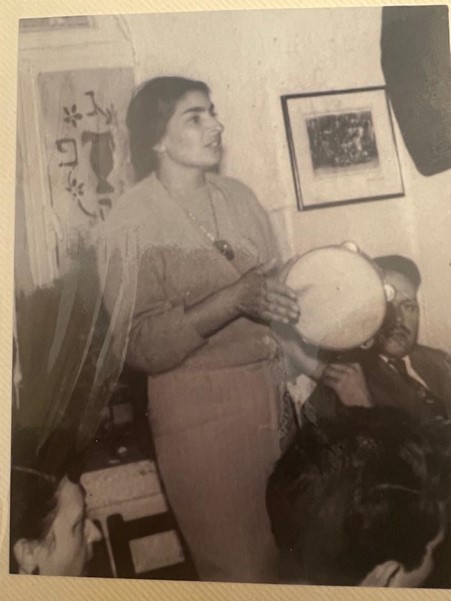
Sarah was also well versed in the “Songs of the Land of Israel,” the modern Hebrew repertoire that developed in Israel since the early twentieth century. Her daughter Aviva compiled a book containing the canonic repertoire of Hebrew songs that Sarah used to performed amid Yemenite songs in Arabic. Sarah also composed and performed songs on topical issues. For example after the “Entebbe Operation” she wrote a song about Ugandan President Idi Amin, also praising the heroism of the IDF soldiers who participated in this daring raid. She also wrote a song of rebuke about Egypt’s President Gamal Abdel Nasser.
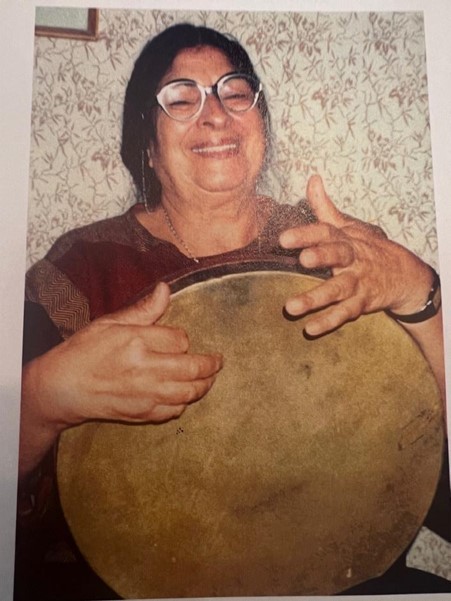
Due to her knowledge of a vast repertoire and performing skills Sarah was invited to join professional ensemble that specialized on the staging of Jewish folklore. She declined the invitation by the legendary Yemenite dance and theatre entrepreneur Sarah Levi-Tanai to join the prestigious Inbal Dance Company. Her loyalty to the authentic patterns of performing traditional ceremonies did not leave room for modern artistic arrangements or innovations. Through the mediation of Yosef Ben Israel, the commanding director of the Folklore Department of Kol Israel, the radio station of the Israel Broadcasting Authority, she agreed to appear on radio programs in the 1950s and 1960s. She also used to volunteer regularly to perform and sing in front of IDF soldiers and inmates in prisons. She received several certificates of appreciation for her volunteering.
In 1997 she traveled with Prof. Amnon Shiloah to an international event titled “Sacred Sounds: Belief and Society,” held by the Center for Folklore and Cultural Heritage at the Smithsonian Institute in Washington D.C. The conference took place on June 25-29 and July 2-6, 1997 and Sarah performed in it traditional songs of Yemenite Jewish women, while being awarded a certificate of recognition for her contribution for the preservation of her cultural heritage.
The Amnon Shiloah Collection at the Sound Archives of the National Library of Israel contains many hours of interviews with Sarah Harat conducted by his research collaborator Dr. Mira Spiegel, as well as recordings and transcriptions of her songs (see here). Our entry on Sarah Harat draws from these rich archival materials.
Sarah and Obadiah Harat had three children, Aviva, Ehud and Eldad. A member of her family is the musician Yigal Hared (1942-2021), a distinguished songwriter and arranger who wrote and composed for the band Tzliley HaKerem, for the Yemenite singer Avner Gadasi and more.[2] We would like to thank Aviva Harat-Ketter for kindly sharing with us her memories of her mother and for facilitating to us additional materials for their publication in our website.
This Sarah Harat Heritage Project was made possible by a grant from the Badichi Foundation at the Hebrew University of Jerusalem.
[1] Rachel Halevi, "Stretch Forth Your Hand to the Henna" Yemenite Music in Israel as Reflected in the Contemporary Henna Ceremony, Ph.D. diss, The Hebrew University of Jerusalem (2011). (Hebrew)
[2] See "Yigal Hared" at Wikipedia. (Hebrew)



